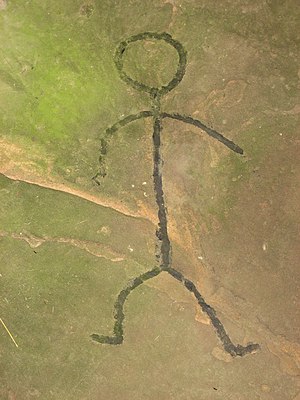Leo Petroglyph
Leo Petroglyph | |
 Comprehensive view of the petroglyph site | |
| Nearest city | Coalton, Ohio |
|---|---|
| Coordinates | 39°9′2.91″N 82°40′29.29″W / 39.1508083°N 82.6748028°W |
| Area | 12.3 acres (5.0 ha) |
| NRHP reference No. | 70000501[1] |
| Added to NRHP | November 10, 1970 |
The Leo Petroglyph is a sandstone petroglyph containing 37 images of humans and other animals as well as footprints of each. The petroglyph is located near the small village of Leo, Ohio (in Jackson County, Ohio) and is thought to have been created by the Fort Ancient peoples (possibly AD 1000–1650). The area in which the sandstone petroglyph was found is on the edge of an unglaciated Mississippian sandstone cliff 20–65 feet (6.1–19.8 m) high. A 20 by 16 feet (6.1 m × 4.9 m) slab containing the 37 carvings is protected by a wooden shelter, a Works Progress Administration project. The meanings of the drawings are unknown. On November 10, 1970, it was added to the National Register of Historic Places. The site is maintained by the Ohio History Connection.[2][3][4]

References
[edit]- ^ "National Register Information System". National Register of Historic Places. National Park Service. March 13, 2009.
- ^ Downing, Bob (November 19, 2000). "Indian stone carvings in Ohio". The Akron Beacon Journal. p. 105. Retrieved March 10, 2023.
- ^ West-Volland, Patricia A. (November 2, 2008). "Honoring Native Americans: Leo Petroglyph inscriptions show prehistoric times". The Times Recorder. p. 26. Retrieved March 10, 2023.
- ^ Post, Connie (May 16, 2015). "Ancient Ohio artwork rocks!". Dayton Daily News. p. 33. Retrieved March 10, 2023.
External links
[edit]- "Leo Petroglyphs & Nature Preserve". Ohio Historical Society.
- Labadie, John (Winter 1992). "The Rock Art of Ohio: A Look into the Past and an Agenda for the Future". Ohio Archaeologist. 42 (1): 10–5. hdl:1811/55903.
- Koch, Arthur Richard (1976). Floristics and ecology of algae on sandstone cliffs in east- central and southeastern Ohio (PhD Thesis). Ohio State University. OCLC 973336298. ProQuest 302813854.
- Fort Ancient culture
- Petroglyphs in Ohio
- Pre-statehood history of Ohio
- Archaeological sites on the National Register of Historic Places in Ohio
- Protected areas of Jackson County, Ohio
- National Register of Historic Places in Jackson County, Ohio
- Ohio History Connection
- Sandstone in the United States
- Appalachian Ohio Registered Historic Place stubs



